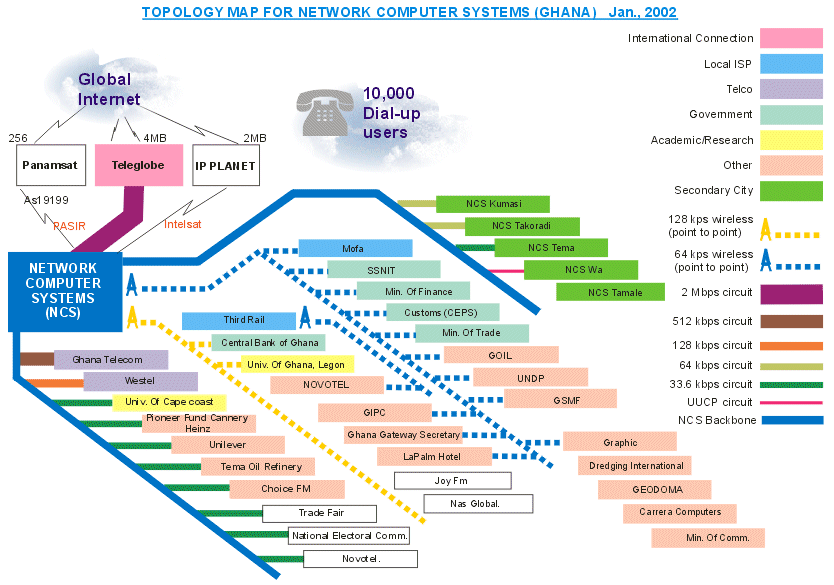Ten years ago: Ghanaian bandwidth nationalism
Nii Quaynor is perhaps the original Ghanaian Internet pioneer. Not only did he start one of West Africa’s first Internet providers, Network Computer Systems of Accra, but he has been director of ICANN for the Africa region and is founding chairman of AfriNIC. Additionally, Mr. Quaynor holds positions on UN, World Bank, ITU, and Internet Society endeavors. Impressive, to say the least.
Mr. Quaynor’s successes didn’t happen by letting the international bandwidth paradigm dominate the Ghanaian telecoms industry. Instead, Mr. Quaynor followed a nationalistic (and practical) ideology: effectively punish Ghanaians who access international sites and propose that affluent countries support higher-than-reasonable Internet costs (up to 40x higher than in the U.S.) in developing Africa.
The high costs due to a lack of infrastructure were compounded by the fact that roughly half of Ghanaian Internet traffic went to U.S.-based Hotmail and Yahoo. To top off the issue, most Ghanaian firms hosted websites abroad. Accordingly, Ghanaian networks were unnecessarily congested with international traffic. To Mr. Quaynor, a prudent man who had his mind on long-term economic sustainability, the solution was to encourage Ghanaian traffic. In today’s Facebook age, however, these practices of bandwidth nationalism would be unlikely to carry much support.
A 2001 Boston Globe article (actually part of a three-day series on wiring Africa) highlights how Network Computer Systems allocated bandwidth to some of its subscribers:
- NCS would closely monitor traffic of major accounts
- Users faced increased usage rates if a large enough share of traffic went to international servers (rather than .gh sites)
- Moreover, NCS would adjust the network to limit the bandwidth for those accessing non-African sites (a punishment, of sorts)
Additionally, Quaynor considered having foreign users who email Ghana pay a fee to the ISP, much like how the phone companies structured usage. He, along with others at the Internet Society, also debated tacking on a “moral obligation fee” to Internet users in more affluent nations. Foreigners would therefore contribute to infrastructure-building efforts in Africa.
Of course, these nationalist recommendations did not stick, and today we have an open Internet with data caps (if they even exist) based on absolute or time-of-day data rather than international data flow. Ten years ago, the Ghanaian business climate was not nearly as lucrative as it is now to foreign investment. GDP was not as strong either. One of the ways to even the playing field was to handicap African access costs.
The importance of this example is how Mr. Quaynor took initiative to stand up for the African public. His innovative viewpoints undoubtedly contributed to the telecoms growth Ghana now experiences.













 Twitter
Twitter Facebook
Facebook Pinterest
Pinterest